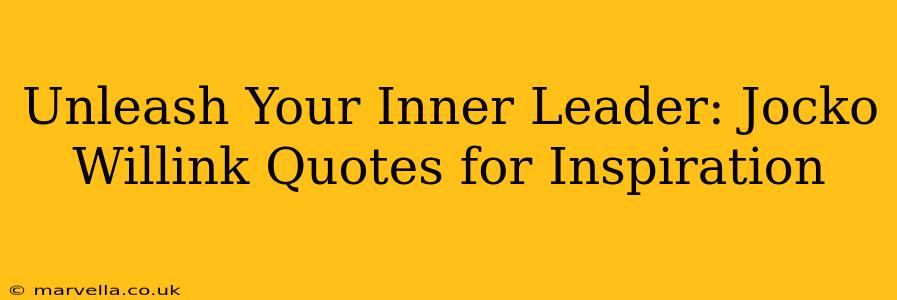Jocko Willink, a decorated Navy SEAL and leadership expert, has inspired millions with his no-nonsense approach to leadership and personal development. His impactful quotes offer profound insights into achieving success, both personally and professionally. This article delves into some of his most powerful statements, exploring their meaning and relevance to modern life. We'll unpack the wisdom behind these quotes and demonstrate how you can apply them to cultivate your own leadership capabilities. Whether you're a seasoned executive, a new manager, or simply striving for self-improvement, Jocko's words offer a powerful roadmap for success.
Understanding Jocko Willink's Leadership Philosophy
Before diving into specific quotes, it's crucial to understand the core tenets of Jocko Willink's leadership philosophy. He emphasizes the importance of discipline, accountability, and teamwork. His experiences in high-pressure situations, like combat operations, have shaped his understanding of effective leadership – an understanding he shares generously through his books, podcasts, and public speaking engagements. He stresses the need for adaptability, communication, and a willingness to take responsibility. These principles underpin the wisdom found in his many inspirational quotes.
"Good" vs. "Good Enough": Striving for Excellence
One of Jocko's frequently cited quotes highlights the difference between "good" and "good enough." He often emphasizes the importance of constantly striving for excellence, not settling for mediocrity. This isn't about perfectionism; it's about a commitment to continuous improvement and exceeding expectations. It means constantly evaluating your performance, identifying areas for growth, and actively working to refine your skills and processes. This constant self-assessment fuels progress and fosters a culture of high achievement.
What does “good enough” really mean in leadership?
“Good enough” in leadership, according to Jocko, signifies complacency. It means accepting subpar performance, failing to adapt to changing circumstances, and neglecting opportunities for growth. It’s a mindset that hinders progress and stifles innovation. True leadership requires a relentless pursuit of excellence, pushing beyond comfort zones and striving for continuous improvement in yourself and your team.
How can I apply this to my daily life?
To apply this principle, adopt a mindset of continuous learning. Regularly reflect on your actions, identifying areas where you can improve. Seek feedback from trusted sources, and actively work on developing your skills and knowledge. Embrace challenges as opportunities for growth and never settle for less than your best.
The Importance of Discipline and Planning: "Discipline equals freedom"
This powerful statement encapsulates Jocko's belief in the transformative power of self-discipline. He argues that by adhering to a strict regimen of discipline – whether it's in fitness, work, or personal life – you ultimately gain freedom. This freedom isn't just about leisure time; it's the freedom to make choices, to pursue your goals without being hindered by self-doubt or lack of self-control. It’s the freedom to choose your own destiny.
How can discipline lead to freedom?
Discipline provides structure and consistency, allowing you to focus your energy on what truly matters. By establishing routines and habits that align with your goals, you eliminate distractions and procrastination, creating space for greater productivity and achieving freedom from impulsive decisions and self-sabotage.
What are some practical ways to cultivate discipline?
Start small, setting achievable goals and gradually increasing the difficulty. Establish routines, such as waking up early, exercising regularly, and dedicating specific times for focused work. Use tools like planners and to-do lists to track your progress and stay accountable.
Embracing the "Extreme Ownership" Mindset
Jocko’s concept of “Extreme Ownership” is central to his leadership philosophy. It's not just about taking responsibility for your actions; it's about accepting complete accountability for everything within your sphere of influence. This includes taking ownership of your team’s successes and failures, regardless of individual contributions. It demands a proactive approach to problem-solving and a commitment to fostering a culture of accountability within the team.
What does “extreme ownership” look like in practice?
Extreme ownership manifests in consistently taking responsibility, regardless of circumstances. It involves proactively identifying and addressing potential problems before they escalate, openly admitting mistakes, and focusing on solutions rather than placing blame. This approach fosters trust and improves team performance.
How can I cultivate extreme ownership in my own life?
Practice self-reflection, honestly evaluating your contributions and identifying areas where you can improve. Take initiative in problem-solving, even if it’s not directly your responsibility. Communicate clearly and openly with your team, fostering a culture of mutual accountability and support.
Conclusion: Applying Jocko Willink's Wisdom
Jocko Willink's quotes provide a powerful framework for personal and professional growth. By embracing his principles of discipline, accountability, and extreme ownership, you can cultivate strong leadership qualities and achieve your goals. His wisdom isn't just theoretical; it's born from practical experience and a commitment to excellence. Applying these principles will empower you to become a more effective leader, a more disciplined individual, and a more successful person. Remember, the journey to becoming a leader starts with self-reflection and a commitment to continuous improvement.

